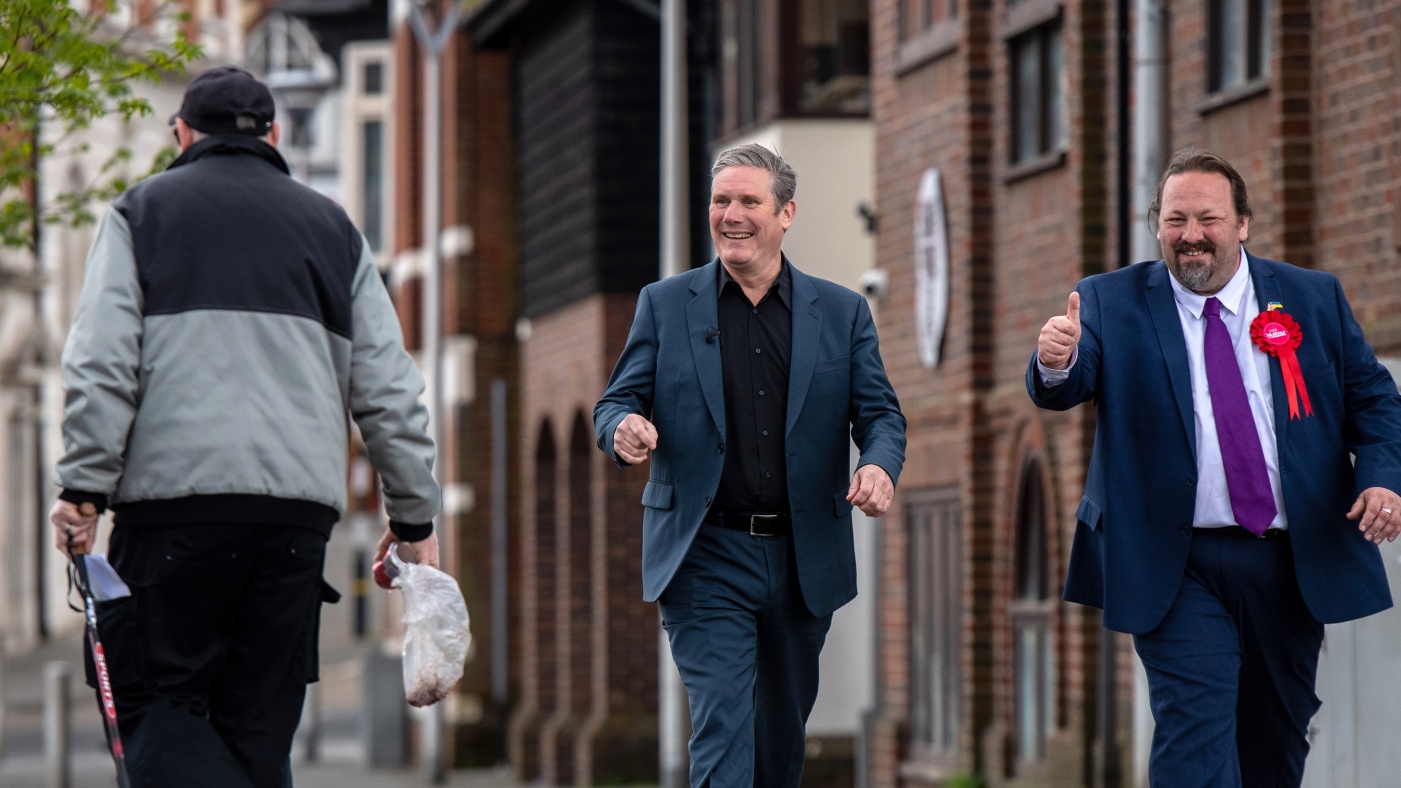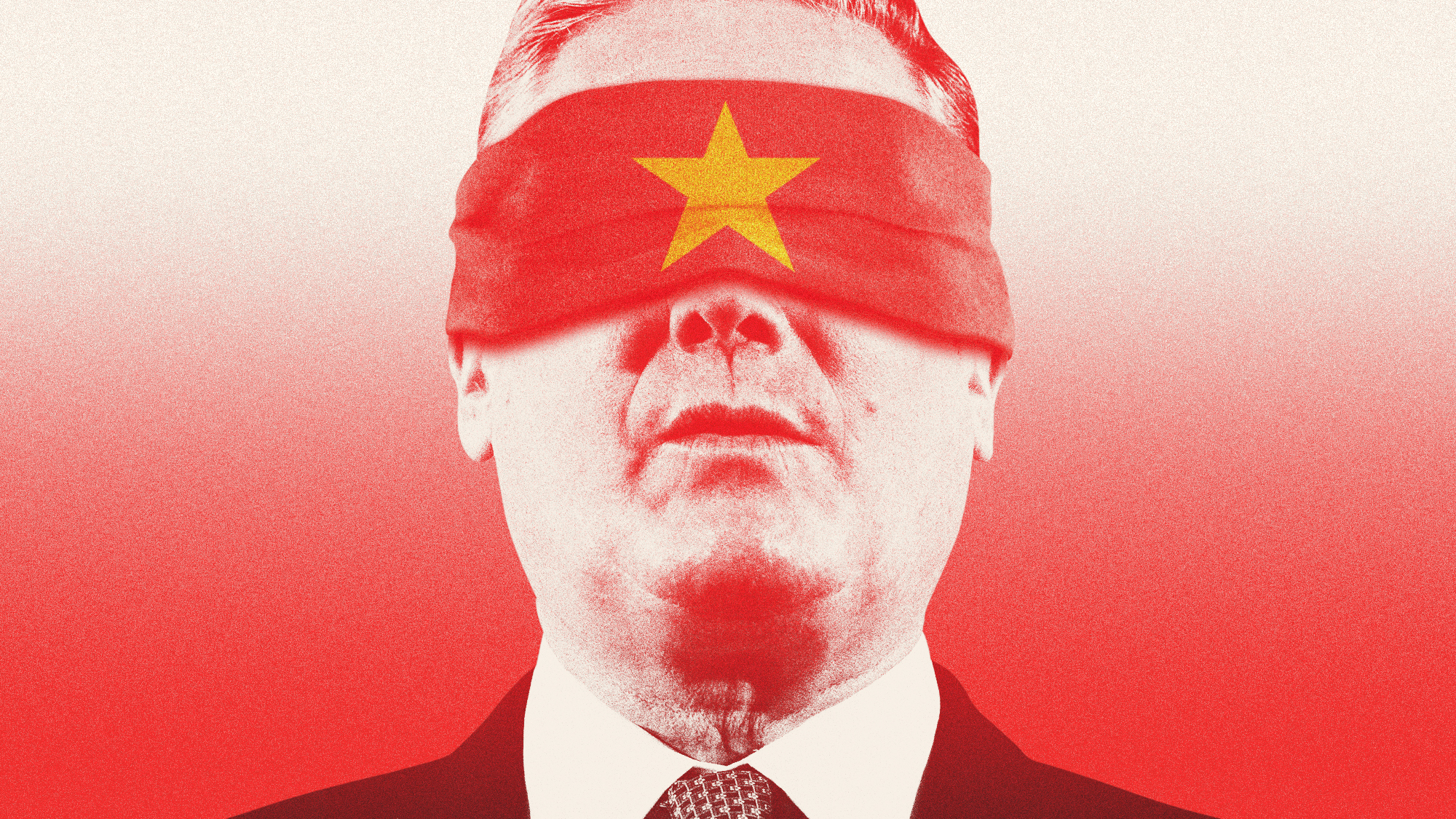Keir Starmer’s transformation of the Labour Party
In pursuit of victory in the next general election, Starmer has steered the Labour Party toward the centre

A free daily email with the biggest news stories of the day – and the best features from TheWeek.com
You are now subscribed
Your newsletter sign-up was successful
In 2019 the Labour Party faced its worst electoral defeat in over 80 years – now the party could be looking at victory in the next general election.
When Keir Starmer, a former director of public prosecution, was elected leader in 2020, the Labour Party stood at a crossroads after enduring four consecutive election defeats.
Promising to unite the party and bring about a much-needed transformation in its fortunes, Starmer “basically said he would be Jeremy Corbyn in a suit without the IRA stuff or Palestine obsession”, one former party aide told the Financial Times (FT).
The Week
Escape your echo chamber. Get the facts behind the news, plus analysis from multiple perspectives.

Sign up for The Week's Free Newsletters
From our morning news briefing to a weekly Good News Newsletter, get the best of The Week delivered directly to your inbox.
From our morning news briefing to a weekly Good News Newsletter, get the best of The Week delivered directly to your inbox.
But three years on from his election as leader, Starmer has “carried out a radical realignment” of the Labour Party, said the FT, having “sidelined the left, taken over the machinery of the party and driven it on to the political ground he thinks can win an election”.
Consolidation of power
One of Starmer’s first steps has been to “nurture a new model army of backbenchers”, said The Spectator’s political editor Katy Balls. His team have made it his business to know the politics of local Labour branches and selection for the first 100 Labour target seats “has been more tightly controlled than at any previous point in the party’s history”, said Balls.
The Labour leader has purged candidates suspected of holding radical left views and assembled a list of centrist or “ideological” candidates to run for the next general election. Most notably, the left-wing mayor of North of Tyne, Jamie Driscoll, was last week blocked from standing for re-election, in a move linked to his appearance on stage with film director Ken Loach, who was expelled from the party in 2021.
Banning Driscoll from re-election shows that Labour is “acting like a narrow clique with no respect for the party’s pluralist traditions”, said Jon Trickett, MP for Hemsworth, writing for Tribune. Not only are the reasons for doing so “spurious”, argued Trickett, but “a Blackfriars-based clique determining who can or cannot stand for the party in the North is a profound mistake” and will do little to win back key communities in the north of England.
A free daily email with the biggest news stories of the day – and the best features from TheWeek.com
Many of the new faces waiting to take the place of those purged “look almost like a Blairite and Brownite restoration”, said The Spectator’s Balls, citing Douglas Alexander, a former New Labour minister, and Emma Reynolds, a Blair-era special adviser. Plus as the moderates return, the “money is close behind them”, she said. “Bankrolling the Starmerarmy are many Blairites from the past: Waheed Alli as Labour’s head of election fundraising, with Lords Sainsbury and Levy back in the fold.”
Revamped policy agenda
Starmer has made radical policy changes since first running for the leadership. Initially making 10 pledges that largely aligned with the Corbynite agenda – still available on Keir Starmer’s website – these included pledges to abolish tuition fees, keep public services in public hands, a higher income tax for the top 5%, and a commitment to “unite our party.” But Starmer has since distanced himself from many of these promises.
The Labour leader has since said the party is “likely to move on from that commitment” on tuition fees. And on privatised utilities, he has been quoted as saying the way to move forward is “going to lie in regulating the market, changing the market, rather than simply taking things into public ownership”. Of course, when it comes to policy decisions, “Starmer’s audience has changed: a Corbyn-era party membership during the campaign, and the wider electorate now”, said Archie Bland of The Guardian’s First Edition newsletter. But it has led many both inside and outside the party “to question whether he ever meant what he originally said”.
Labour’s Starmer-led policy trajectory has shown similarities to some of the popular policies championed by Boris Johnson and the Conservative Party, said Patrick Maguire for The Times Red Box. In 2020, Johnson was promising “to do better: to reform our system of government, to renew our infrastructure; to spread opportunity more widely and fairly and to create the conditions for a dynamic recovery that’s led not by the state but by free enterprise”, and had announced plans for a £12 billion “green industrial revolution”, powered by provincial industry.
And all of this, “give or take the emphasis on the role of the state, we have since heard from Starmer and Reeves”, said Maguire. Indeed, Starmer’s confidants seem to “embrace” the comparison, with one telling Maguire: “Which party’s manifesto will look most like the 2016 Vote Leave and 2019 Tory offer? It’s ours.”
Yet a Labour victory is still far from assured, said Yasmeen Serhan for Time. Few Britons “appear to know who he is or what he stands for”, while he is “dogged by perceptions that he is wooden, distant, and even a bit boring”. Overall, he is yet to convince British voters that “Labour has what it takes to bring Britain back from the brink”.
King in the north
But Starmer’s fortunes have been significantly boosted by recent developments on the political scene, said Stephen Bush in the FT.
The departure of Boris Johnson and his allies from parliament, as well as the crisis facing the Scottish National Party – following the arrest and the subsequent release without charge of former leader Nicola Sturgeon – is ultimately “good news” for Labour.
The absence of Johnson allows more attention to be focused on the “crises engulfing both Rishi Sunak and the Conservatives, and creates two eminently winnable by-elections for his party”. Meanwhile, the challenges faced by the SNP make it easier for Labour to achieve a parliamentary majority “both numerically and politically”. “The big picture of all this is simple, I think: Keir Starmer is going to become prime minister,” said Bush.
Sorcha Bradley is a writer at The Week and a regular on “The Week Unwrapped” podcast. She worked at The Week magazine for a year and a half before taking up her current role with the digital team, where she mostly covers UK current affairs and politics. Before joining The Week, Sorcha worked at slow-news start-up Tortoise Media. She has also written for Sky News, The Sunday Times, the London Evening Standard and Grazia magazine, among other publications. She has a master’s in newspaper journalism from City, University of London, where she specialised in political journalism.
-
 Political cartoons for February 15
Political cartoons for February 15Cartoons Sunday's political cartoons include political ventriloquism, Europe in the middle, and more
-
 The broken water companies failing England and Wales
The broken water companies failing England and WalesExplainer With rising bills, deteriorating river health and a lack of investment, regulators face an uphill battle to stabilise the industry
-
 A thrilling foodie city in northern Japan
A thrilling foodie city in northern JapanThe Week Recommends The food scene here is ‘unspoilt’ and ‘fun’
-
 The Mandelson files: Labour Svengali’s parting gift to Starmer
The Mandelson files: Labour Svengali’s parting gift to StarmerThe Explainer Texts and emails about Mandelson’s appointment as US ambassador could fuel biggest political scandal ‘for a generation’
-
 Will Peter Mandelson and Andrew testify to US Congress?
Will Peter Mandelson and Andrew testify to US Congress?Today's Big Question Could political pressure overcome legal obstacles and force either man to give evidence over their relationship with Jeffrey Epstein?
-
 Reforming the House of Lords
Reforming the House of LordsThe Explainer Keir Starmer’s government regards reform of the House of Lords as ‘long overdue and essential’
-
 How long can Keir Starmer last as Labour leader?
How long can Keir Starmer last as Labour leader?Today's Big Question Pathway to a coup ‘still unclear’ even as potential challengers begin manoeuvring into position
-
 What is at stake for Starmer in China?
What is at stake for Starmer in China?Today’s Big Question The British PM will have to ‘play it tough’ to achieve ‘substantive’ outcomes, while China looks to draw Britain away from US influence
-
 Can Starmer continue to walk the Trump tightrope?
Can Starmer continue to walk the Trump tightrope?Today's Big Question PM condemns US tariff threat but is less confrontational than some European allies
-
 Alaa Abd el-Fattah: should Egyptian dissident be stripped of UK citizenship?
Alaa Abd el-Fattah: should Egyptian dissident be stripped of UK citizenship?Today's Big Question Resurfaced social media posts appear to show the democracy activist calling for the killing of Zionists and police
-
 Is Keir Starmer being hoodwinked by China?
Is Keir Starmer being hoodwinked by China?Today's Big Question PM’s attempt to separate politics and security from trade and business is ‘naïve’